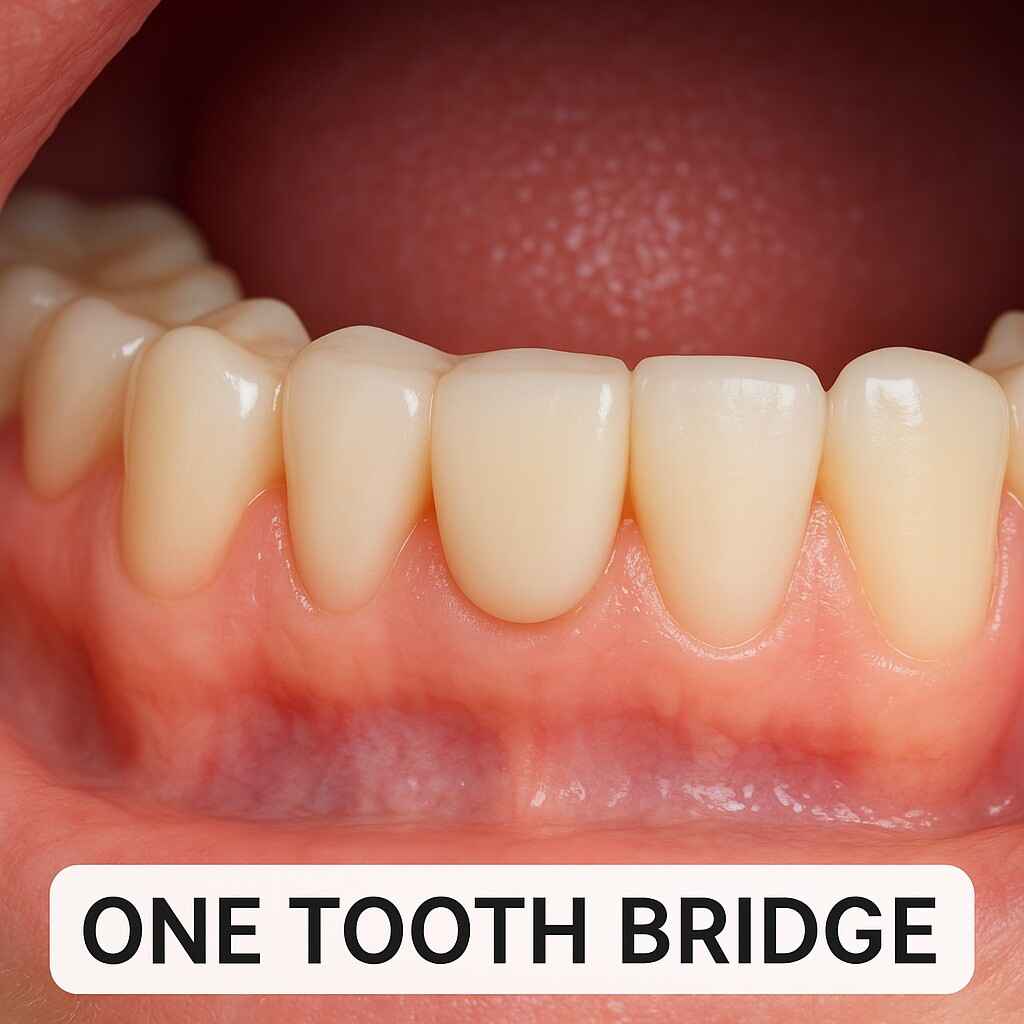Why do you need a one tooth bridge? Replacing a missing tooth isn’t just about aesthetics. It’s essential for chewing, speaking clearly, and preventing other teeth from shifting out of place. One reliable solution for restoring a single missing tooth is a single tooth bridge. In this guide, we’ll break down everything you need to know, including the “one tooth bridge cost”, types, pros and cons, and comparisons with other options like implants.
| Feature | Details |
|---|---|
| Procedure Name | One Tooth Bridge |
| Used For | Replacing a single missing tooth |
| Average Lifespan | 5 to 15 years |
| Permanent or Removable | Can be both |
| Materials Used | Porcelain, ceramic, metal alloys |
| Common Alternatives | Dental implant, removable dentures |
What Is a One Tooth Bridge?
A one-tooth bridge is a type of dental bridge designed to replace a single missing tooth. It’s supported either by adjacent teeth or a dental implant. The bridge includes a false tooth (pontic) held in place by crowns on the neighboring teeth or by bonding to the back of them, depending on the type.
Yes, you can have a one-tooth bridge, and it often becomes a preferred option when bone density isn’t sufficient for an implant or when quicker restoration is needed.
Who Needs a Single-Tooth Bridge?
You might consider a single tooth bridge if:
- You have a single missing tooth
- Adjacent teeth are healthy and strong enough for support
- You prefer a quicker solution than implants
- Bone volume is insufficient for implant placement
- You’re seeking a more affordable solution
These are also viable for both front and back teeth, including a one front tooth bridge or a one missing tooth bridge scenario.
Types of Single Tooth Bridges (Compared)
Here’s a clear comparison table outlining the major types of single tooth bridges:
| Bridge Type | Support Structure | Longevity | Estimated Cost (USD) | Best For |
|---|---|---|---|---|
| Traditional Bridge | Two crowned teeth | 10–15 years | $1,000 – $2,500 | General cases |
| Cantilever Bridge | One adjacent tooth | 5–10 years | $900 – $2,000 | Front teeth with low pressure |
| Maryland Dental Bridge | Resin wings, no crowns | 5–10 years | $800 – $2,300 | Minimal prep needed |
| Implant-Supported | Dental implant | 15+ years | $3,000 – $5,000+ | High durability needed |
The Maryland bridge teeth cost less in terms of preparation but may loosen over time. It’s often used for one front tooth bridge needs.
Pros of Choosing a Single Tooth Bridge
Benefits of a single tooth bridge include:
- Non-surgical: Unlike implants, most types require no surgery
- Faster process: Usually completed within 2-3 dental visits
- Restores function and aesthetics quickly
- Prevents shifting of surrounding teeth
- Lower cost than implants
- Option for removable single tooth bridge for flexibility
If you’re wondering, “is a dental bridge permanent?”—it can be semi-permanent or permanent, depending on the type. Traditional and implant-supported bridges are typically considered permanent.
Cons and Limitations to Know
While convenient, there are some drawbacks:
- Requires grinding down healthy teeth (except Maryland or implant-supported types)
- May lead to decay if hygiene isn’t maintained
- Less durable than implants
- Some types, like the Maryland dental bridge, can debond and fall out
- Not suitable for people with weak or damaged neighboring teeth
Cost Breakdown
How much does a single tooth bridge cost? That depends on several factors:
- Type of bridge
- Materials used (porcelain, zirconia, ceramic)
- Location and clinic expertise
- Insurance coverage (or lack thereof)
Estimated Cost Table
| Region/Type | Price Range |
|---|---|
| Traditional Bridge (USA) | $1,000 – $2,500 |
| Maryland Dental Bridge (USA) | $800 – $2,300 |
| Cantilever Bridge (USA) | $900 – $2,000 |
| One Tooth Bridge Cost UK | £800 – £1,800 |
| Average Price in New Jersey | $1,200 – $2,600 |
| Dental Bridge Cost Without Insurance | $1,000 – $3,000 |
If you’re asking, “How much should a one-tooth bridge cost?” — nationally, the average cost of a single tooth bridge ranges between $1,000 to $2,500 in the U.S., depending on complexity and type. The price for a single tooth bridge is often 40% to 60% less than a dental implant.
Procedure Explained
Here’s what to expect from the installation process:
- Initial Exam & X-rays: Dentist checks the missing area and surrounding teeth
- Tooth Prep (if needed): Neighboring teeth may be reshaped for crowns
- Impressions Taken: Mold or digital scan sent to the lab
- Temporary Bridge: Optional, used while waiting for the permanent one
- Bridge Fitting: Final adjustment and bonding
- Cementation: Permanent attachment, followed by bite check
This process takes about 2 to 3 appointments for most traditional bridges.
Aftercare Tips
Maintaining your new bridge is essential for longevity:
- Brush twice daily using fluoride toothpaste
- Floss under the bridge using floss threaders or water flossers
- Avoid sticky or hard foods early on
- Visit your dentist every 6 months
These habits prevent gum issues, decay, and loosening.
Common Problems and Solutions
If you face issues, here’s what they might mean:
- Bridge feels loose: Adhesive may be failing; visit your dentist
- Gum irritation: Poor fit or hygiene; needs adjustment
- Discoloration: Happens over time; consider replacement
- Falling out: Often with Maryland types; may need rebonding
Alternatives to a One-Tooth Bridge
If a single tooth bridge isn’t for you, here are other options:
Dental Bridge vs Implant
| Feature | Dental Bridge | Dental Implant |
|---|---|---|
| Surgery Required | No | Yes |
| Involves Nearby Teeth | Yes | No |
| Cost | Lower | Higher |
| Longevity | 5-15 years | 15+ years |
| Bone Preservation | No | Yes |
Removable Partial Denture
- Cheaper and easier to maintain
- Not fixed, less natural feeling
- Often used for temporary gaps
Do Nothing (Not Recommended)
- Can lead to bone loss, shifting, and bite misalignment
How to Choose the Right Option
Factors to Consider:
- Budget: What can you afford upfront or with insurance?
- Time: Need a quick fix or long-term solution?
- Aesthetic Goals: Front teeth may need better cosmetic results
- Bone Health: Enough bone for implant or not?
- Durability Preference: Short-term vs long-term commitment
Is a Single Tooth Bridge Worth It?
If you’re asking, “Can you get a one-tooth bridge?”, the answer is yes, and for many, it’s the perfect blend of affordability, aesthetics, and speed. While it may not last as long as an implant, it avoids surgery and is more budget-friendly. For people looking to restore a smile, single tooth bridge pictures often show dramatic improvements.
The key is to consult with a skilled dentist who can recommend the best material and type of bridge for your case.
FAQs About One Tooth Bridge
What does a one-tooth bridge look like?
It looks like a natural tooth, held in place with crowns or metal wings, depending on the type.
Can you have a one tooth bridge?
Yes. Whether it’s a front or back tooth, bridges are designed for single-tooth replacement.
How much does a one-tooth bridge cost?
National average: $1,000 – $2,500. Varies by location, type, and material.
What is the average price for a one-tooth bridge in New Jersey?
Approximately $1,200 to $2,600 without insurance.
Is a dental bridge permanent?
Most types are considered semi-permanent but can last 10-15 years or more with proper care.


